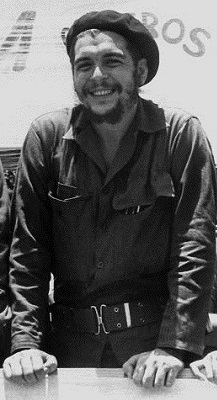|
~ Ernesto Che Guevara
~ Galéria
~ Oldal
~ Bejelentkezés
~ Vissza a Főoldalra
Ernesto Che Guevara, az argentin származású forradalmár, miniszter, gerillavezér és író, Buenos Aires-ben szerzett orvosi diplomát, majd a kubai forradalom során jelentős szerepet játszott a szigetország felszabadításában és újjáépítésében. A kubai gazdaság talpraállításáért dolgozott, küzdött az oktatás és az egészségügy fejlesztéséért, az írástudatlanság és a faji előítéletek felszámolásáért. Saját példájával népszerűsítette az önkéntes munkát. Kongóban és Bolíviában is harcolt - harminckilenc éves volt, amikor az amerikai-bolíviai csapatok csapdába ejtették és kivégezték.
| | |
|

| | |
|
|
|
1960
|
Mára elkészült Che Guevara életrajzának következő része - ezúttal az 1960-as esztendő eseményeit foglaltam össze.
Ahogyan már tegnap, a Galériafeltöltésnél is írtam: 1960 egy meglehetősen eseménydús év volt Che számára. Megszületett az Aleida-val közös első gyermeke, számtalan gazdasági egyezményt kötött, számtalan megbeszélésen vett részt, hogy javítson az ország sorsán és újabb országokba tett látogatást.
Fidel Castro mellett ő lett Kuba egyik legnépszerűbb embere.
Itt elolvashatjátok: [1960]
|
|
For today a new part of Che Guevara's biography has been written - this time I have summarised the events of the year 1960.
As I wrote about it yesterday, because of the gallery update: 1960 was a fairly busy year for Che. His first child with Aleida was born, he signed countless economic agreements, he attended countless meetings in order to repair the situation in the country, and even visited a few new countries.
Besides Fidel Castro, he became one of the most popular people of Cuba.
You can read it here: [1960]
|
|
|


| | |
|
|
|
~ Ernesto Che Guevara
~ Gallery
~ Site
~ Log in
~ Back to the Main page
Ernesto Che Guevara, the Argentine-born revolutionary, minister, guerrilla leader and writer, received his medical degree in Buenos Aires, then played an essential part in the Cuban Revolution in liberating and rebuilding the country. He did his best to set up the Cuban economy, fought for the improvement of the education and the health system, the elimination of illiteracy and racial prejudice. He promoted voluntary work by his own example. He fought in the Congo and in Bolivia - he was thirty-nine years old, when he was trapped and executed by the joint American-Bolivian forces.
| | |
|
|

